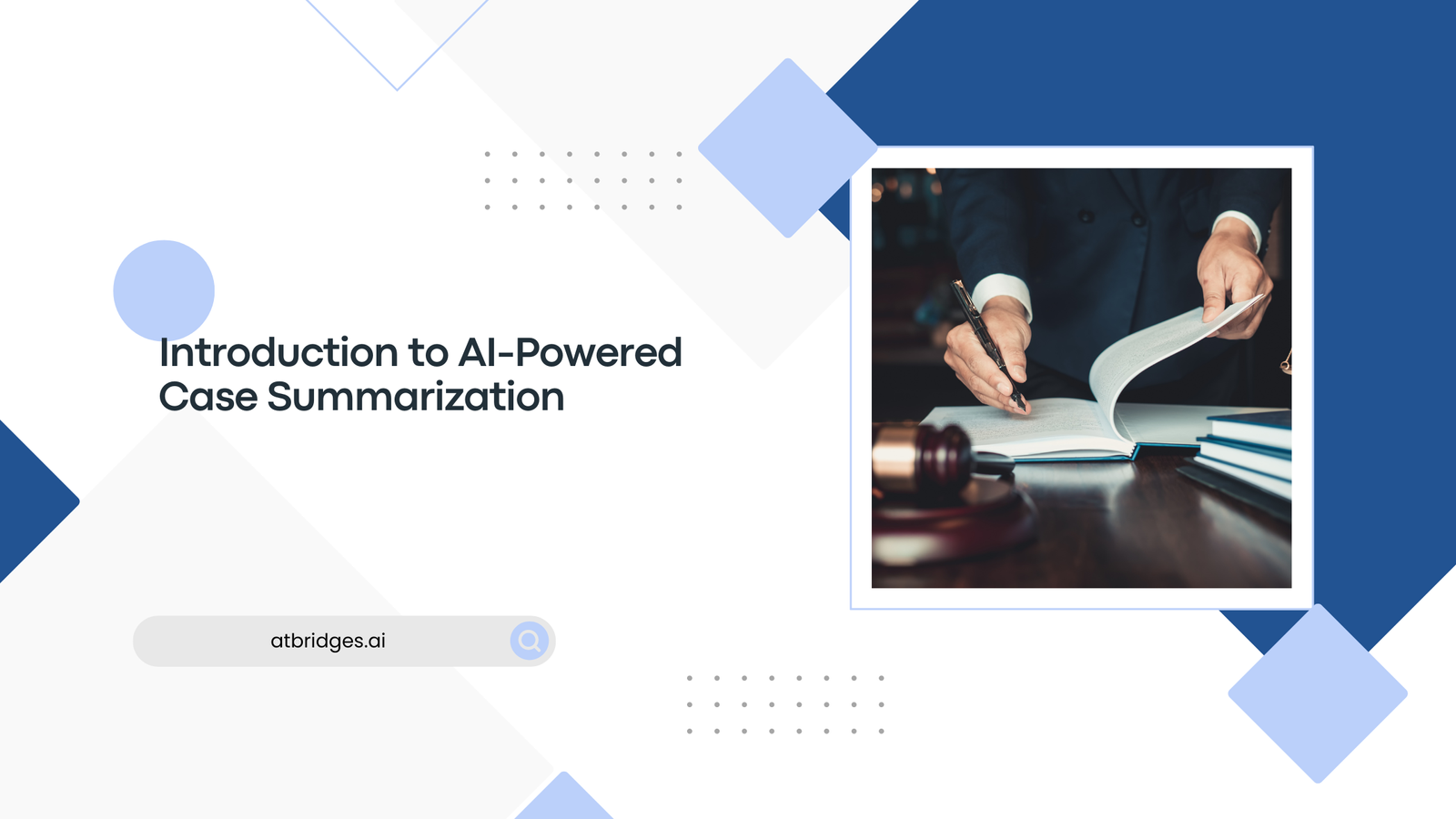Introduction to AI-Powered Case Summarization

Efficiency and accuracy are two of the most important requirements in today's fast-paced legal arena. AI case summarization is a game changer as to how attorneys manage the vast information linked to a legal case. It uses artificial intelligence to break down complicated legal documents to bite-sized, actionable summaries that are meant to greatly accelerate attorney performance while enabling better decision-making in the field.
What is AI-Powered Case Summarization? A Beginner's Guide
AI case summary uses artificial intelligence to identify the most significant points from case documents such as briefs, rulings, and contracts. It makes sense of these essentials without having to require much manual or extensive involvement through language pattern analysis and relevant data identification.
Key Point: AI systems can sift through tons of legal data at incredible speeds, providing insights that may take a long time for humans to process.
How AI Is Revolutionizing Legal Case Summarization
Legal case summarization has always been a time-consuming process that requires the expertise of legal professionals and much time to sift through documents in question. In the course of time, it has taken legal professionals hours upon hours searching through various documents to identify what mattered most.
Legal professionals can now do summary work much faster and more accurately using AI. This reduces paperwork to a certain extent and saves valuable time, giving attorneys ample opportunities to focus on important aspects of the case.
AI vs. Human Summarization: Can AI Keep Up?
Though AI processes and summarizes content very quickly, that effectiveness needs to be contrasted with human summarization.
Advantages of AI in Summarization:
Efficiency: AI can summarize many thousands of pages of text in a fraction of the time that a human attorney might take.
Accuracy: AI's summaries are provided without the risks of human error associated with fatigue or personal bias.
Benefits of Human Writing:
Contextual Knowledge: The human attorney will have their learning and experience to bring to bear on interpretations of nuances in the law.
Judgment and Expertise: Legal professionals can apply the nuances of law in ways AI cannot today.
Key Advantages of AI in Legal Case Summarization
AI has various benefits in summarizing legal cases. Five key advantages are elaborated below:

How AI Understands and Summarizes Legal Cases: A Technical Overview
For one to understand how AI-based summarization is done, he or she has to first understand the technicality involved. From a technological perspective, AI relies on NLP and ML algorithms which analyze the text as well as produce the summary.
Natural Language Processing (NLP)
NLP enables machines to understand, decode, and create human language. This is crucial in processing legal jargon and terminology so that AI systems may summarize legal documents correctly.
Machine Learning Algorithms
AI systems make use of several machine learning algorithms to identify the underlying patterns in legal texts and draw relevant information from them.
Important Note: These algorithms are trained over huge datasets of legal cases, hence they are better at summarizing new cases effectively.
Summarization Techniques
AI uses two significant summarization techniques:
Extractive Summary: This type of technique simply copies sentences from the source text to create a summary. It is reliable for facts and often easier to implement.
Abstractive Summarization: These are new sentences, even just phrased to summarize the contents of the text while mimicking how a human would write a summary. It provides more unique insights but is only feasible with advanced AI capabilities.
Challenges and Limitations of AI in Case Summarization
Even with the many benefits AI brings with it, there are challenges and limitations.
Quality of Input Data
Input data quality and comprehensiveness define how accurate the AI-created summaries will be. Summaries mirror the shortcomings of the training data if that is biased or incomplete.
Legal language is inherently complex and sometimes involves sophisticated legal argumentation or even technical vocabulary that AI systems may not understand well.
Ethical Issues
The use of AI in the legal world does raise ethical issues concerning data privacy, biases in algorithms, and human oversight in AI.
Future of AI-Based Case Summarization
From the day technology first started to emerge in the way of changing the course of history, AI-based case summary is likely to change a lot.That is, future AI systems will be more advanced in understanding legal contexts, and their summaries will be even better and more reliable.
Integration with Other Technologies
AI-based summarization tools can be integrated with other legal tech solutions, such as contract management systems or legal research databases, to make the performance of legal workflows much easier for legal professionals.
Further Development in NLP and ML
As NLP and machine learning algorithms become more developed, AI will increasingly be able to understand and summarize the legal text much more effectively, thereby enhancing the amount of support it could provide to the legal experts.
Conclusion
AI-powered case summarization is changing the legal map by making summary a faster, more accurate and less expensive process. Of course there are challenges and limitations within this technology, but these pale in comparison to the benefits. As we open ourselves to this future and true human subject matter expertise can truly shine, doing what professionals do best-getting the job done for clients-then that future is one step closer.
As AI continues to advance, it will play an increasingly vital role in the legal industry, ultimately enhancing the efficiency and effectiveness of legal practice.